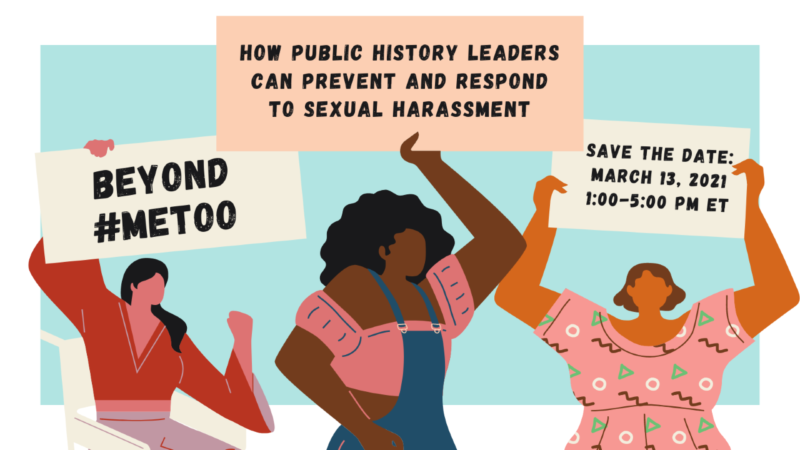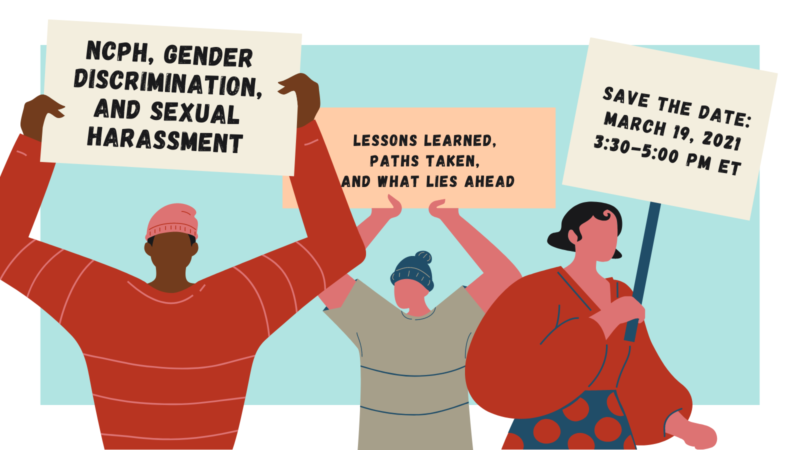A call for resources on sexual harassment and gender discrimination in public history
12 March 2021 – Kristyn Scorsone
The National Council on Public History (NCPH) board-led Subcommittee on Gender Discrimination and Sexual Harassment is collecting a list of resources to share with public history professionals. During this month’s virtual NCPH Annual Meeting, please join us in assembling and assessing resources on topics of gender discrimination and sexual harassment to empower public historians to take action when necessary at work, to provide resources on these issues to those who teach and train public historians, and to provide resources to anyone in the field who has been a victim of sexual harassment or gender discrimination. Here is the background on recent project progress, followed by some ways you can contribute in the coming weeks and months.

Join Chel Miller and Michelle Carroll on March 13 from 1 pm-5 pm (Eastern) for their virtual workshop, “Beyond #MeToo: How Public History Leaders Can Prevent and Respond to Sexual Harassment.” Image credit: Chel Miller
Recently, Samantha Rosenthal, who is a member of the subcommittee’s policy team (which also includes Joan Zenzen, Modupe Labode, and Kristen Baldwin Deathridge), wrote a powerful History@Work post on how they are drafting guidelines that are influenced by a transformative justice framework to respond to sexual harassment. Part of Rosenthal’s post discussed their painful experiences being misgendered on a tour of a small historic site. They brought to light how dangerous public history sites can feel to her as a trans woman.
My public history experience is limited to my current graduate work as a Ph.D. student, but I have spent over two decades in the workforce holding jobs in numerous industries. As a trans masculine queer and non-binary person, I experienced years of sexual harassment, intense bullying, and retaliation at several places of work that included the fields of publishing and veterinary medicine. I had naively assumed that publishing and veterinary medicine, which are female-dominated and tend to attract bookish, humanitarian types, were less likely to be hostile environments for a queer person like me. Sadly, much of the harassment I experienced came from straight and cisgender female superiors.
What’s more, I am also a survivor of sexual assault. As a result, my safety is always at the forefront of my mind when choosing the spaces I inhabit and the people I surround myself with, personally and professionally. I left the publishing world and my other life as a veterinary technician because I found the university environment at Rutgers University-Newark, especially within my degree program in American Studies, to be a sanctuary space. There, I have been able to be my authentic self without much fear of harassment. My hope upon graduation is to become a professional public historian whether that be in the academic world or within a museum, historic site, or nonprofit organization.
I am profoundly dismayed, however, by the extent of the problem of gender discrimination and sexual harassment in the public history field outlined by my colleague, Samantha Rosenthal, and many others. In her post for History@Work, Mary Rizzo points out that
According to a Marist poll from 2017, 22% of adults in the United States and 35% of women have experienced sexual harassment at work. While public historians may think of their work as a calling or a kind of public service, they are also workers who are in need of protections. Women, people of color, and LGBTQ and gender non-binary people are at greater risk of harassment and discrimination in any field, including public history. Allowing harassment and discrimination to continue shows these groups that they are powerless and not really welcome in our field, no matter what our rhetoric of diversity and inclusion may say.
On the one hand, I have to reconcile with the idea of entering yet another professional world that seems benign on the surface, and yet, wherever I am fortunate enough to be hired, it is a real possibility that I will again be met with some kind of abuse. On the other hand, this realization also means that I am one of a team of people deeply committed to this work and deeply committed to doing it right.
As a member of NCPH’s board-led Subcommittee on Gender Discrimination and Sexual Harassment, I serve alongside a smaller team of folks who broke off from the main subcommittee to form the resources team. Our team is comprised of Mary Rizzo, Hope Shannon, Chel Miller, and me. Together, we approach this task from a range of experiences that includes education, leadership and management, small and large organizational work, and nonprofit work on survivor advocacy and sexual violence prevention and response.
It is a difficult task that requires a fine-tooth comb to sift through available resources. As we evaluate potential offerings, we must ask ourselves questions about quality, intent, and relevance. Is this resource truly helpful? Who is the author and who is the audience? Is it a resource written solely from a typical human resources perspective where protection of the institution is paramount rather than the needs of the survivor? Does it take into account multiple forms of identity and attend to issues impacted by the intersections of race, ethnicity, gender, sexuality, class, ability, and so on? We must also consider which resources best suit different work environments by taking into account, for example, what is more relevant to educators in a university setting versus historians in nonprofit organizations versus staff who deal directly with the public. Once we gather all resources, we will have to contend with the question of how to keep these offerings fresh as our understandings of gender discrimination and sexual harassment evolve and situations change. For instance, COVID-19 has brought new ways of working remotely using video conferencing technologies like Zoom. Therefore, what are the best ways for institutions to assess and remedy harm when it happens in virtual spaces?
We aim to meaningfully remedy harm related to sexual harassment and gender discrimination within the field of public history. In order to provide the best possible resources that respond to your actual professional experiences and needs, we need to hear from folks in the field. We invite you all to talk to our team members about these issues and raise any questions you may have at the upcoming annual meeting, “The Presence and Persistence of Stories,” happening virtually March 8-27, 2021. We will invite feedback at our session, “Lessons Learned, Paths Taken, and What Lies Ahead,” on March 19 from 3:30 pm-5 pm (Eastern), as well as at the virtual workshop, “Beyond #MeToo: How Public History Leaders Can Prevent and Respond to Sexual Harassment,” with Chel Miller and Michelle Carroll on March 13 from 1 pm-5 pm (Eastern). This workshop is geared towards “public history leaders,” or public historians with decision-making power at their organizations. Public history leaders will learn about how to implement effective policies and procedures and support culture change in their organizations. The goal is to ensure that public history workers are not tasked with the responsibility of avoiding the traumatic experiences of gender discrimination and sexual violence. Rather, public history leaders must own the responsibility of creating an environment in which workers are safe and supported and there are tangible consequences for harassment, harm, and abuse.

Join NCPH Subcommittee on GDSH and provide feedback on March 19 from 3:30pm-5pm at our session, “Lessons Learned, Paths Taken, and What Lies Ahead.” Image credit: Chel Miller
If you are unable to attend either session, there are other ways to send feedback. Chel Miller created a survey to crowd-source sample policies. It was designed so that folks can share their thoughts as well as upload files directly in the survey. Please also feel free to share in the comments section of this post any resources you would like us to consider! If you would prefer, you are welcome to send feedback directly to me at k.scorsone [at] Rutgers [dot] edu.
~Kristyn Scorsone (they/she) is a PhD candidate in American Studies at Rutgers-Newark focusing on LGBTQ history, urban history, African American women’s history, and public history. They are a member of the Queer Newark Oral History Project and recently were a graduate assistant for the Humanities Action Lab.



